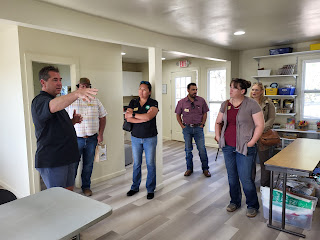Water Issues Facing Farmers and Ranchers in the Pecos Valley of New Mexico
In mid-April, class 15 traveled to Artesia, NM to visit with several professionals tied to agriculture and natural resource development in the region. One of the topics covered was water issues facing farmers and ranchers that live in the Pecos Valley. Mr. Aron Balok, superintendent of the Pecos Valley Artesian Conservancy District (PVACD) spoke on the subject. Established in 1931, the PVACD is funded through mill levies. The mission of the PVACD is to monitor water use in the region, while navigating regulations that impact the waters that travel through the district. Its board of directors is made up of local citizens, farmers, ranchers, and oil and gas personnel that all provide input to Mr. Balok. It is then his job to ensure all obligations are met as effectively as possible.
Water is vital to support both agriculture and oil production in this very productive area of New Mexico. The battle over water between industries and even between states makes use regulation very challenging. The state office of engineers oversees use allocation across the state. The state as a whole must remain compliant with policies that ensure enough water is passed on to Texas, while still leaving enough for those who own water rights for beneficial use here in New Mexico. Since this district is the last “stop” of water flow out of New Mexico into Texas, it is imperative the area stays within their water allotments. In order to meet this obligation, the PVACD plays a vital role in monitoring use through an extensive metering program. Under the guidance of Mr. Balok, the PVACD has made great strides to make sure the aquifer below and the surface water above remain at adequate levels for use, while improving on water conservation.



Comments
Post a Comment